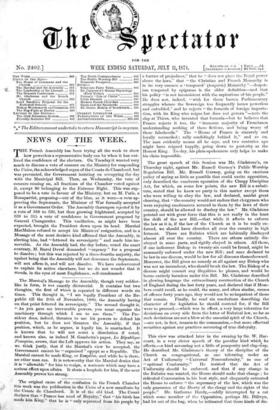The original cause of the confusion in the French Chamber
this week was the publication in the Union of a new manifesto by the Comte de Chambord. It is of the old kind. The Count declares that " France has need of Royalty," that " his birth has made him King," that he is " only separated from his people by a barrier of prejudices," that he " does not place the Royal power above the laws," that " the Christian and French Monarchy is in its very essence a tempered' (teznperee) Monarchy "—despot- ism tempered by epigrams is the older definition—and that his policy "is not inconsistent with the aspirations of his people." He does not, indeed, "wish for those barren Parliamentary struggles whence the Sovereign too frequently issues powerless and enfeebled," and he rejects " the formula of foreign importa- tion, with its King who reigns but does not govern "—note the slap at Thiers, who invented that formula—but he believes that France rejects it too, the "immense majority of Frenchmen understanding nothing of these fictions, and being weary of these falsehoods." The " House of France is sincerely and loyally reconciled ; rally confidingly behind it," and so on. The man evidently means all he says, and two centuries ago might have reigned happily, going down to posterity as the Honest King. To-day, his plain-spokenness only helps to make his claim impossible.


































